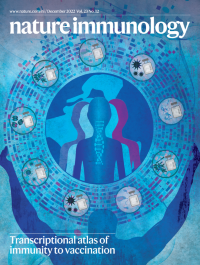Volume 23
-
No. 12 December 2022
Transcriptional atlas of immunity to vaccinationTwo groups led by Pulendran and Sékaly performed a transcriptional analysis in pre-vaccinated and post-vaccinated individuals to provide an atlas of immune responses to vaccination.
See Pulendran et al. and Sékaly et al.
-
No. 11 November 2022
Immune pathways underlying chronic stress-related complicationsGodbout and colleagues review the influence of social defeat stress on the immune system that may underlie stress-sensitization within three key cellular compartments: neurons, microglia and monocytes.
-
No. 10 October 2022
Translation efficiency during T cell activationNaive T cells are quiescent but undergo dynamic changes after antigenic activation. Flavell and colleagues show that upregulation of the tRNA methyltransferase proteins TRMT61A and TRMT6 and N 1-methyladenosine modification of tRNAs contribute to accelerated mRNA translation efficiency, in particular synthesis of MYC protein, and are required for rapid T cell proliferation.
-
No. 9 September 2022
ILC3 patrolling of the intestinal barrierSerafini and colleagues show that intestinal villus ILC3s, which are largely immotile at steady state, develop a patrolling behavior in response to inflammation.
See Angélique Jarade et al.
-
No. 8 August 2022
Control of lymph node swellingSixt and colleagues show that different fibroblast populations in the lymph node mechanically control its swelling in a multitier fashion
See Sixt et. al.
-
No. 7 July 2022
scRNA-seq analysis of human erythroid precursorsShi and colleagues describe a subset of erythroid precursors with immune characteristics that can be isolated at various developmental stages from the yolk sac to the adult bone marrow during human ontogenesis.
See Shi
-
No. 6 June 2022
Pan-sarbecovirus neutralizing antibodiesA broad neutralizing antibody (bnAb) response is required to combat SARS-CoV-2 variants of concern. Andrabi and colleagues isolated and characterized a large panel of sarbecovirus bnAbs from individuals who had recovered from COVID-19 and been recently vaccinated. Many of these antibodies can neutralize all variants of concern and demonstrate prophylaxis in mice infected with diverse sarbecoviruses.
See Andrabi
-
No. 5 May 2022
ILC1s as anti-cancer immune cellsHow ILC1s respond to cancer cells is controversial. Caligiuri and colleagues show that IFNγ released by ILC1s can control acute myeloid leukemia by promoting apoptosis of leukemia stem cells and by favoring their differentiation into non-leukemic cells.
See Caligiuri
-
No. 4 April 2022
Formation of memory precursor NK cellsNatural killer (NK) cells are innate lymphocytes that possess traits of adaptive immunity, such as memory formation. O’Sullivan and colleagues show that the transcription factor Fli1 has important roles in controlling the establishment of NK cell memory.
See O’Sullivan
-
No. 3 March 2022
Ex vivo expanded macrophagesSieweke and colleagues show that alveolar macrophages maintain a core gene expression program even after several months in culture, and reacquire full transcriptional and epigenetic identity after transplantation into the lung.
See Sieweke
-
No. 2 February 2022
Immunology of COVID-19Nature Immunology has commissioned a Series of Reviews and a Perspective that discuss the innate and adaptive aspects of the immune response to SARS-CoV-2, the possible mechanisms behind the large clinical variability in the response to infection, and considerations for vaccine and therapy strategies.
See https://www.nature.com/collections/aeacbbicec
-
No. 1 January 2022
Vitamin D–mediated reduction in inflammationDuring homeostasis, TH1 cells activate a cell-intrinsic inflammatory shutdown program and shift to IL-10 cytokine production. Chauss et al. find that this TH1 cell homeostatic program is dependent on vitamin D signaling and is disrupted during severe COVID-19.
See Afzali












